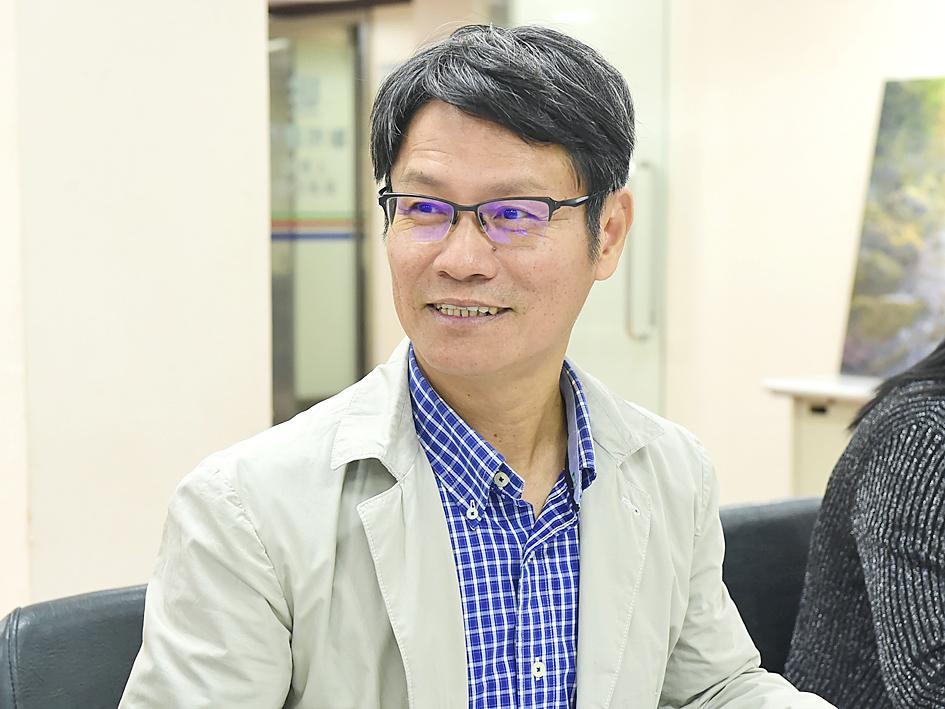The number of students choosing to take practical exams on music and the arts as part of university admissions has dropped 37 percent over the past decade, data released on Sunday by the College Admission Practical Examination Committee showed.
There were 7,173 test takers across the two subjects in the 2012-2013 school year, but that figure fell to 4,523 in the 2021-2022 academic year, a decrease of 2,650 students, committee data showed.
This has affected admission rates at university arts departments, with Tainan National University of the Arts reporting a 60 percent decline in applications for some programs in the past few years.

Photo: Pan Shao-tang, Taipei Times
Ministry of Education data showed that in senior-high schools, the number of music students fell from more than 1,900 in 2018 to more than 1,700 this year, while the number of art students remained at about 2,500.
The switch to the 12-Year Basic Education Curriculum Guidelines, as well as inconsistencies between the Arts Education Act (藝術教育法) and the Special Education Act (特殊教育法), have led to problems in administering art education, experts say.
Lawmakers are expected to publish draft amendments to the Arts Education Act in July.
In addition to a declining birthrate, relatively low incomes make it difficult for parents to cover the costs of art education, said Yang Chyi-wen (楊其文), a professor at Taipei National University of the Arts’ cultural heritage and arts innovation studies program.
Instruments alone can cost hundreds of thousands of New Taiwan dollars, he said, adding that graduates who struggle to find jobs in music often switch careers.
Traditional arts programs have been replaced by technology studies, he said, adding that children no longer receive extended training in the arts.
Musical ability is often developed from a young age, but students are no longer encouraged to take art classes early on, he said.
He urged the government to provide schools with better equipment, offer scholarships and help arts graduates find employment.
The arts education environment should be improved, starting with people’s appreciation of the arts, he said.
The Ministry of Culture could help artists hold regular performances at local cultural venues, while the Ministry of Education could subsidize the costs of transportation and meals for elementary and junior-high schools to organize art-themed field trips, he said.
National Taiwan Normal University Department of Fine Arts professor Huang Chin-lung (黃進龍) said that even though enrollment has dropped significantly due to the falling birthrate, university departments have not ceased operations, leading to fears of a decline in the quality of the programs.
Teachers are afraid to make demands of students, and students are being admitted without a screening process, he said.
This affects the quality of the programs, he said, adding that the government should address the issue.
Arts classes at senior-high schools also face quality control issues, including an unwillingness of local education departments to hire more teachers, he said.

A group of Taiwanese-American and Tibetan-American students at Harvard University on Saturday disrupted Chinese Ambassador to the US Xie Feng’s (謝鋒) speech at the school, accusing him of being responsible for numerous human rights violations. Four students — two Taiwanese Americans and two from Tibet — held up banners inside a conference hall where Xie was delivering a speech at the opening ceremony of the Harvard Kennedy School China Conference 2024. In a video clip provided by the Coalition of Students Resisting the CCP (Chinese Communist Party), Taiwanese-American Cosette Wu (吳亭樺) and Tibetan-American Tsering Yangchen are seen holding banners that together read:

UNAWARE: Many people sit for long hours every day and eat unhealthy foods, putting them at greater risk of developing one of the ‘three highs,’ an expert said More than 30 percent of adults aged 40 or older who underwent a government-funded health exam were unaware they had at least one of the “three highs” — high blood pressure, high blood lipids or high blood sugar, the Health Promotion Administration (HPA) said yesterday. Among adults aged 40 or older who said they did not have any of the “three highs” before taking the health exam, more than 30 percent were found to have at least one of them, Adult Preventive Health Examination Service data from 2022 showed. People with long-term medical conditions such as hypertension or diabetes usually do not

POLICE INVESTIGATING: A man said he quit his job as a nurse at Taipei Tzu Chi Hospital as he had been ‘disgusted’ by the behavior of his colleagues A man yesterday morning wrote online that he had witnessed nurses taking photographs and touching anesthetized patients inappropriately in Taipei Tzu Chi Hospital’s operating theaters. The man surnamed Huang (黃) wrote on the Professional Technology Temple bulletin board that during his six-month stint as a nurse at the hospital, he had seen nurses taking pictures of patients, including of their private parts, after they were anesthetized. Some nurses had also touched patients inappropriately and children were among those photographed, he said. Huang said this “disgusted” him “so much” that “he felt the need to reveal these unethical acts in the operating theater

Heat advisories were in effect for nine administrative regions yesterday afternoon as warm southwesterly winds pushed temperatures above 38°C in parts of southern Taiwan, the Central Weather Administration (CWA) said. As of 3:30pm yesterday, Tainan’s Yujing District (玉井) had recorded the day’s highest temperature of 39.7°C, though the measurement will not be included in Taiwan’s official heat records since Yujing is an automatic rather than manually operated weather station, the CWA said. Highs recorded in other areas were 38.7°C in Kaohsiung’s Neimen District (內門), 38.2°C in Chiayi City and 38.1°C in Pingtung’s Sandimen Township (三地門), CWA data showed. The spell of scorching